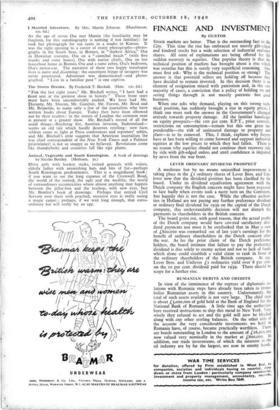FINANCE AND INVESTMENT
By CUSTOS
STOCK markets are better. That is the outstanding fact in the City. This time the rise has embraced not merely gilt-edged and kindred stocks but a wide selection of industrial ordinary shares. All sorts of explanations are being offered for the sudden recovery in equities. One popular theory is that the technical position of markets has brought about a rise which was overdue but this is surely very superficial reasoning. One must first ask : Why is the technical position so strong? The answer is that potential sellers are holding off because they have decided to remain invested. In this decision there is an element of resignation mixed with patriotism and, in the vast majority of cases, a conviction that a policy of holding on and seeing things through is not merely patriotic but good business.
When one asks why demand, playing on this strong tech- nical position, has suddenly brought a rise in equity prices, I think one must seek the answer in the Government's changed attitude towards property damage. All the familiar handicaps on equity prospects—the Jo() per cent. E.P.T., price controls. restrictions on consumption—remain but this one great im- ponderable—the risk of uninsured damage to property and plant—is to be removed. This, I think, explains why buyers have at last been willing to come forward and support industrial equities at the low prices to which they had fallen. There is no reason why equities should not continue their recovery side by side with gilt-edged unless and until confidence is impaired by news from the war front.
LEVER ORDINARY DIVIDEND PROSPECT
A moderate but by no means unjustified improvement is taking place in the £i ordinary shares of Lever Bros. and Uni- lever now that the dividend position has been clarified by the board. Under its dividend equalisation agreement with the Dutch company the English concern might have been expected to fare badly when events took a nasty turn on the Continent, but happily this is not the case. While the effective authori- ties in Holland are not paying any further preference dividend or ordinary final dividend for 1939 on the capital of the Dutch company, this understandable decision will not disturb the payments to shareholders in the British concern.
The board point out, with good reason, that the actual profits of the Dutch company would have covered satisfactory divi- dend payments nor must it be overlooked that in May a sum of £800,000 was earmarked Out of last year's earnings for the benefit of ordinary shareholders in the- Dutch concern after the war. As for the prior claim of the Dutch preference holders, the board intimate that failure to pay the preference dividend is due solely to enemy action and not to lack of funds which alone could establish a valid claim to rank in front of the ordinary shareholders of the British company. At 24S. Lever Bros. and Unilever kr ordinaries yield over 8 per cent. on the 10 per cent. dividend paid for 1939. There should be scope for a further rise.
RUMANIAN DEBITS AND CREDITS
In view of the imminence of the rupture of diplomatic re- lations with Rumania steps have already been taken to immo- bolise Rumanian assets in this country. Unfortunately, the total of such assets available is not very large. The chief item is about £3,000,000 of gold held at the Bank of England for the National Bank of Rumania. A little time ago the authorities here received instructions to ship this metal to New York. Very wisely they refused to act and the gold will now be blocked along with any other sterling balances. On the other side of the account the very considerable investments we hold in Rumania have, of course, became practically worthless. There are bonds outstanding in London to the amount of £16,500,000 now valued very nominally in the market at £600p00. In addition, our trade investments, of which the interests in the oil industry are by far the largest, are now in enemy hands.






























 Previous page
Previous page